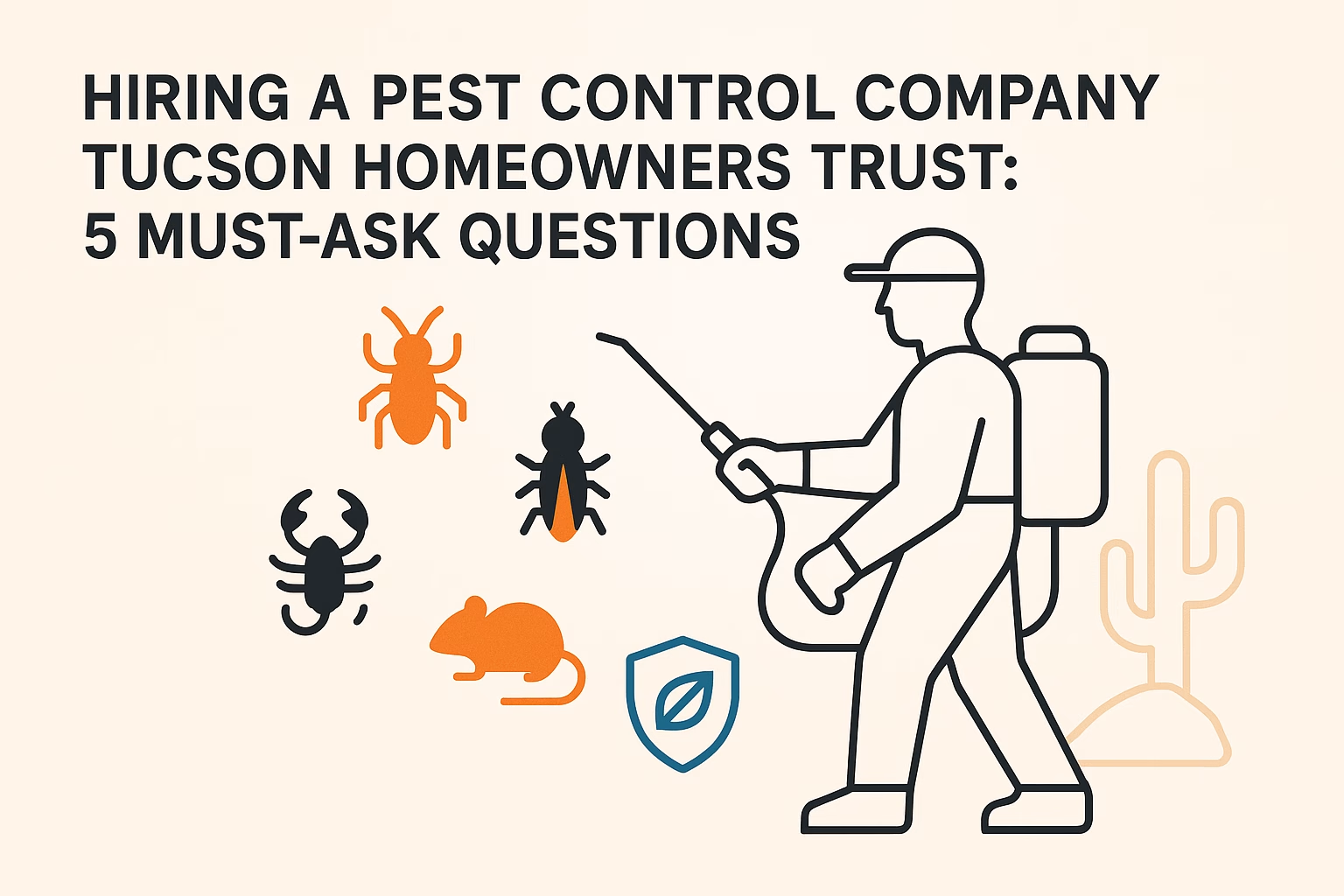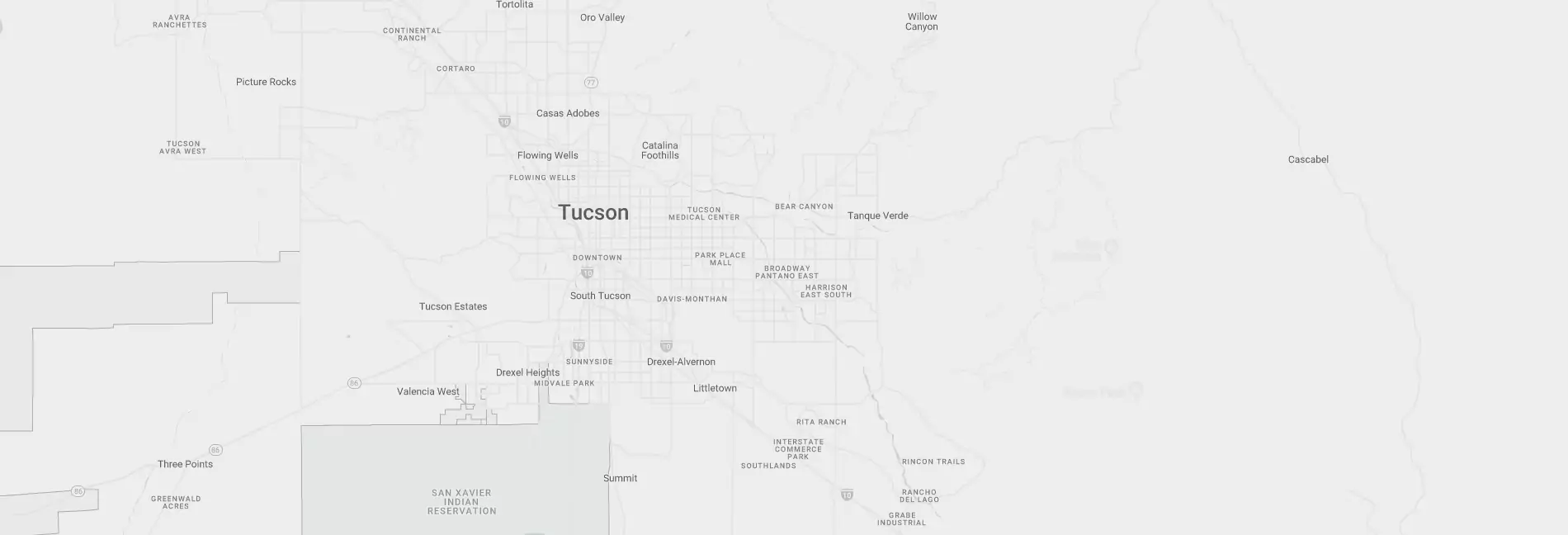Introduction
Don’t let desert pests win: the smart guide to hiring a pest control company Tucson homeowners can trust
Between scorching summers, sudden monsoon downpours, and desert landscaping, Tucson creates the perfect storm for pests. If you’re considering hiring a pest control company Tucson residents recommend, a little homework goes a long way. The right partner keeps scorpions out, termites away, and rodents from nesting—without risking your family, pets, or pollinators.
The problem: Tucson’s unique pests, monsoon season, and too many options make it hard to choose wisely
Search “best pest control Tucson” and you’ll find dozens of providers, each promising fast results. But Tucson isn’t like other cities. Local pests behave differently, rains can wash treatments away, and block walls offer sneaky entry points. Choosing a generic provider or the cheapest bid often leads to re-infestations, upsells, and disappointment.
The solution: Use these five must-ask questions to vet any Tucson exterminator and avoid costly mistakes
Below are the five questions that separate a good Tucson exterminator from a risky one. Use them to compare companies objectively, protect your home, and get dependable results season after season.
Before You Call: Tucson-Specific Pest Pressures to Know
The usual suspects in Tucson: bark scorpions, termites, cockroaches, pack rats, roof rats, and spiders
Expect pressure from:
- Arizona bark scorpions that shelter in block wall voids and cool garages.
- Subterranean termites that exploit foundation cracks and moisture foraging lines.
- Cockroaches (American, German, and Turkestan) thriving in drains, sheds, and clutter.
- Pack rats and roof rats nesting in engine bays, attics, and citrus trees.
- Spiders (including black widows) drawn to cluttered corners and outdoor furniture.
How monsoon season and desert landscaping drive sudden infestations
Monsoon moisture triggers termite swarms, drives scorpions and roaches indoors, and accelerates vegetation growth that shelters rodents. Rock mulch and native shrubs are beautiful, but without trimming and barrier space, they become pest highways to your foundation and weep holes.
Home risk factors: block walls, weep holes, attic/garage gaps, citrus trees, wood piles, and cluttered yards
- Block walls & weep holes: Common scorpion and spider entry points.
- Attic and garage gaps: Invite rodents and wasps to build unnoticed.
- Citrus trees and dense shrubs: Food and cover for rats; keep limbs off roofs and walls.
- Wood piles & stored clutter: Prime harborage for termites, spiders, and roaches.
Question 1: Are you licensed, insured, and experienced with Tucson’s desert pests?
What Arizona credentials to ask for (state licensing, insurance, and technician training)
- Arizona Department of Agriculture (AZDA) Pest Management Division license: Ask for the company’s business license number and the technician’s certification details for structural and termite work.
- Insurance: Proof of general liability and workers’ compensation.
- Training: Ongoing continuing education (CEUs) and documented technician training, especially for scorpions, termites, and rodents.
Experience that matters: scorpion control, termite treatments/warranties, and rodent exclusion in Tucson neighborhoods
 Online Only Pricing!
Online Only Pricing!
Tucson Pest Control—Fast, Local, Guaranteed
Book in minutes. Lock in our online-only rate and get priority scheduling.
- Stops ants, spiders, mice & pack rats
- No long-term contracts
- Family & pet-friendly options
- Money-back guarantee
Online takes ~60 seconds.
No gimmicks—just your price & schedule.
Prefer to talk? We can't guarantee our online prices over the phone.
We're happy to talk! Call us at (520) 476-0879
- Scorpions: Barrier treatments, wall void dusting, and sealing recommendations specific to block construction.
- Termites: Licensed to perform trench-and-treat, foam injections, or baiting; offers transferable warranties and annual inspections.
- Rodents: Exclusion skills (screening, gap sealing), safe trapping protocols, and vegetation clearance guidance tailored to Tucson lots.
Red flags: vague answers, no written proof, door-to-door pressure, or subcontracting without disclosure
- Cannot provide license numbers or insurance certificates on request.
- High-pressure, door-to-door pitches or “today-only” pricing.
- Subcontracting core services without telling you who’s doing the work.
- One-size-fits-all plans with no mention of inspection or IPM.
Question 2: What does your inspection include, and how will you tailor a treatment plan for my home?
What a thorough Tucson inspection should cover (attic, garage, block wall gaps, weep holes, landscaping, pack rat middens)
A credible inspection goes beyond a quick perimeter walk. It should include:
- Exterior: Block wall cracks, weep holes, foundation expansion joints, utility penetrations, and drip lines.
- Landscaping: Dense shrubs, rock borders, mulch edges, citrus trees, and irrigation leaks.
- Structures: Garage door seals, attic entry points, rooflines, and soffits.
- Rodents: Pack rat middens, gnaw marks, droppings, and rub trails along walls and fences.
- Moisture: Hose bib leaks, A/C condensation discharge, and poor grading that attracts termites.
Integrated Pest Management (IPM) vs. “spray and pray”: prevention, sanitation, exclusion, and targeted treatments
IPM focuses on long-term control with the least risk. Expect a blend of:
- Prevention: Habitat modification and sealing entries.
- Sanitation: Cutting clutter, securing trash, and reducing food/water sources.
- Exclusion: Screens on weep holes, door sweeps, and mesh over vents.
- Targeted treatments: Baits, dusts, and barriers applied precisely where pests live and travel.
Questions to ask a Tucson exterminator during the walkthrough (entry points, nesting sites, moisture issues, and follow-up plan)
- Where are my highest-risk entry points and how will you seal or treat them?
- What nesting sites or harborage areas did you find, and what’s the plan to eliminate them?
- Which moisture issues should I fix to deter termites and roaches?
- What is the follow-up plan, including timelines and reinspection?
Question 3: Which products will you use, and how do you protect people, pets, pollinators, and the environment?
Product transparency: specific names, labels, EPA registration, and when baits, dusts, or liquid barriers are appropriate
- Ask for product names and labels: Including EPA registration numbers and Safety Data Sheets (SDS).
- Right tool for the job:
- Scorpions: Residual barriers plus targeted dusting in wall voids and attic spaces.
- Cockroaches/ants: Baits and gels placed in discreet, child- and pet-inaccessible locations.
- Termites: Trench-and-treat with non-repellent termiticides or bait systems; foaming in galleries when needed.
Application best practices for Tucson heat and monsoons (timing, exterior perimeter, block wall voids, and attic dusting)
- Timing: Early morning or evening to reduce heat stress and product breakdown.
- Monsoon-aware scheduling: Apply before rains when possible; reservice if torrential downpours occur shortly after application.
- Exterior perimeter focus: Foundation-to-fence line, expansion joints, and eaves.
- Block wall voids and penetrations: Inject dusts or foams where pests harbor.
- Attic dusting: As needed for scorpions and spiders, following label and safety protocols.
Safety protocols: pet/kid precautions, drift prevention, pollinator awareness, and indoor vs. outdoor strategies
- Pets and kids: Dry-time guidance, temporary relocation during interior service, and secure bait placements.
- Drift prevention: Low-pressure application and avoiding windy conditions.
- Pollinators: No spraying blooms; treat when bees are least active and use non-repellent products where appropriate.
- Indoors vs. outdoors: Prefer exterior-first strategies; reserve interior treatments for active issues and monitor afterward.
 Online Only Pricing!
Online Only Pricing!
Tucson Pest Control—Fast, Local, Guaranteed
Book in minutes. Lock in our online-only rate and get priority scheduling.
- Stops ants, spiders, mice & pack rats
- No long-term contracts
- Family & pet-friendly options
- Money-back guarantee
Online takes ~60 seconds.
No gimmicks—just your price & schedule.
Prefer to talk? We can't guarantee our online prices over the phone.
We're happy to talk! Call us at (520) 476-0879
Question 4: What are your pricing, contract, and service frequency options?
How to compare quotes to find the best pest control Tucson value (what’s included, add-ons, and avoiding upsells)
- Written quotes: Itemize inspection, initial service, follow-ups, and any one-time treatments.
- Inclusions: Which pests are covered (scorpions, rodents, termites often priced differently).
- Add-ons: Exclusion work, bee removal, gopher control—price these separately to avoid surprises.
- Upsell guardrails: Beware of vague “premium” packages without clear deliverables.
Contracts decoded: month-to-month vs. long-term, cancellation terms, retreat guarantees, and termite warranties
- Month-to-month: Flexible; ideal if you’re testing a provider.
- Annual/long-term: Often lower per-visit cost; ensure easy cancellation and clear service levels.
- Retreat guarantees: Free re-services between scheduled visits if pests reappear.
- Termite warranties: Transferable, with annual renewal inspection and clear retreat/repair terms.
Service frequency: monthly, bi-monthly, or quarterly—how seasonality and pest pressure should set the cadence
- Monthly: Peak season (late spring through monsoon) or high-pressure areas near washes or open desert.
- Bi-monthly: Balanced choice for many Tucson homes year-round.
- Quarterly: Lower-pressure homes or after significant exclusion improvements.
Question 5: What results should I expect, and how do you stand behind your work?
Guarantees and response times: free re-services between visits, emergency calls after monsoon spikes, and SLA commitments
- Re-service promise: Free return visits if activity persists between appointments.
- Response times: Clear service-level agreements (e.g., 24–48 hours) for urgent issues, especially after monsoon storms.
- Communication: Text/email reminders, technician notes, and next steps after each service.
Proof of progress: monitoring stations, photo documentation, service reports, and prevention upgrades
- Monitoring: Sticky traps, rodent stations, and termite monitors with recorded activity.
- Photo documentation: Visual proof of entry points, repairs, and treatment areas.
- Service reports: Products used, lot numbers, locations treated, and homeowner instructions.
- Upgrades: Recommendations for sealing, screens, and landscape adjustments to reduce future pressure.
Reputation check: how to read local reviews and community threads (like r/Tucson) for consistency, professionalism, and results
- Look for consistent praise on punctuality, education, and follow-through—not just “they sprayed.”
- Scan local forums and neighborhood groups (including r/Tucson) for multi-year experiences, not one-offs.
- Note how the company responds to negative reviews: Do they resolve issues quickly and professionally?
Quick Pre-Hire Checklist
- Verify AZ licensing/insurance and Tucson-specific pest experience.
- Confirm an IPM-based inspection and a customized treatment plan.
- Get product lists, labels, and safety protocols in writing.
- Compare transparent pricing, contract terms, and service frequency.
- Demand guarantees, quick re-service commitments, and credible local reviews.
Conclusion
Key takeaways: In Tucson, the right inspection, IPM approach, clear pricing, and strong guarantees are non-negotiable
Desert pests and monsoon cycles require more than a generic spray. Prioritize licensed pros who inspect thoroughly, practice IPM, disclose products, and back their work with responsive guarantees. That’s how hiring a pest control company Tucson homeowners can trust leads to long-lasting results.
Call to action: Before hiring a pest control company Tucson residents should shortlist 2–3 licensed providers, ask these five questions, compare written quotes, and choose the Tucson exterminator that offers the best blend of expertise, safety, and value
Build a short list of the best pest control Tucson options, schedule inspections, and evaluate them using the five questions above. Pick the Tucson exterminator that demonstrates real local experience, clear communication, and a strong guarantee—then enjoy a pest-resilient home year-round.





